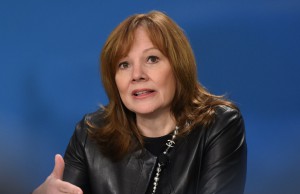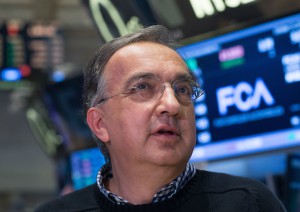
GM CEO Mary Barra has repeatedly said a merger with FCA doesn't make sense; however, GM's hired bankers to help reinforce the point.
Facing continuing pressure from Fiat Chrysler Automobiles Chief Executive Sergio Marchionne, General Motors hired investment bankers to help build its case that a merger of the two carmakers could not work.
GM is being advised by Goldman Sachs, while FCA is working with UBS on the matter, according to Reuters.
Mary Barra, GM’s CEO, bluntly told reporters and shareholders at the GM annual meeting earlier this month that the automaker’s board rebuffed a merger after a careful review of the proposal.
“Our position hasn’t changed. We talk to a number of advisors as a normal course of business on a variety of topics, and we don’t disclose details of those conversations,” GM spokesman Tom Henderson said in an email.

Despite being told "no thanks," Sergio Marchionne continues to keep the pressure on GM about a merger.
Barra’s very public rejection has not stopped Marchionne’s campaign for a merger. He has lobbied GM investors in an effort to drag the GM board back to the negotiating table, Reuters reported.
GM has called in investment bankers in the past to help ward off unwanted attention. In 2006, Nissan-Renault boss Carlos Ghosn had proposed an alliance GM. Like Barra, then-GM Chairman Richard Wagoner had rejected the idea, but facing pressure from maverick investor Kirk Kerkorian, who had accumulated a sizeable block of GM stock, Wagoner had brought in outside advisers to help vet and prepare the rejection of Ghosn’s proposal.
Jerry York, the former Chrysler and IBM executive and long-time Apple Board member, who served as Kerkorian automotive adviser, had warned GM executives in 2006 that the giant automaker was facing a serious crisis if it did not embark on a radical overhaul of its operations. Yorks’ critique, notably the proposal to kill off lackluster brands, such as Pontiac, Saturn and Saab, later found their way into GM’s re-organization plan after GM emerged from bankruptcy in 2009.
(GM’s Barra says merger with FCA is unnecessary. For more, Click Here.)
GM traditionally been the large automaker most susceptible to the whims of Wall Street because most of its stock is publicly traded and Marchionne has seized on the fact. The only other major company as vulnerable to public pressure is Daimler AG since the world’s other major automakers outside China are protected to some extent by a combination of family or direct government interests.
Currently, Marchionne has built his case on the fact the automakers have to prepare for the next downturn now, while sales are strong and the industry has to find a way to reduce development costs, which are escalating dramatically.
Barra, however, has said that with its far flung operations in North America and Asia, which are now more tightly integrated than ever before, GM has the “scale” needed to meet future challenges. Scale in the auto industry means cost of the inputs needed to build a car, which includes everything from components weighing only a few grams to manual labor in a factory to engineering talent, can be spread across a large number of units.
(Click Here for details about Marchionne’s overture to GM.)
FCA doesn’t operate on the same scale as GM and has been criticized for not investing enough resources in the advanced powertrain technology that is expected to define vehicles in the future.
Marchionne, while he has succeeded in pulling off some amazing deals in the past, also appears to have put FCA on the auction block and diminished the FCA US’ dramatic comeback, which has led to 60-plus consecutive months of sales increases, noted one analyst, who asked not be identified. But at the same time FCA may have reached the limits of what it can borrow at a reasonable cost.
However, Dennis Williams, president of the United Auto Workers, indicated that while he’s well aware of Marchionne’s public comments, he also takes them with a grain of salt. “We go over everything every company says publicly,” he said, adding he remains skeptical about the prospects for a GM and FCA merger.
If it was going to cost jobs, the union would oppose it, Williams warned. However, the union would be willing to sit down and do a “deep dive” to see what it might mean “five or 10 years” into the future.
“For Marchionne, it’s now or never,” an industry banker said, adding that industry valuations had reached their peak.
(To see more about Marchionne delaying products while looking for a partner, Click Here.)
FCA, the world’s seventh-largest carmaker with a market capitalization of $20 billion, reported revenues of 96 billion euros last year. It has one of the highest debt piles in the industry, with net industrial debt at 8.6 billion euros.

Marchionne and FCA are looking extremely desperate when he:
1. Sends an e-mail to GM requesting a merger
2. Tries to persuade GM stock holders to insist on a merger
3. Thinks the UAW would support a loss of U.S. jobs
J.D. Power and Consumer reports are reporting of the low quality products coming from FCA. FIAT, Peugeot, and Citiroen are car makers that are in serious trouble. Sergio need to go to Hyundai for a merger. But the sad reality of the car business is the world really doesn’t need FCA. Jeep was a buyable brand before Chrysler ruined them. I guess thats what Fiat found out, after 20 years of mismanagement Chrysler was not such a great bargain. Of course FIAT no bargain either.
You have no idea of what you speak, I will put our products up against any in the world. Who are you to sit on high with no real info just an opinion. How are we in serious trouble? 60 months of continuous sales growth indicates trouble?I bet you are just like CR and JD Power you just love the un-American JAP CRAP.I suppose the world could do without Jay also. Do you read anything? Jeep is an awesome product the Worlds Best in fact people like you spouting off with no knowledge is big problem, learn then speak.
Hi, Chris, I’d suggest that having spent 36 years closely covering the auto industry might count as learning.
Paul A. Eisenstein
Publisher, TheDetroitBureau.com
Oh yeah, a merger with an utterly unwilling partner is just going to be a total success.
Sergio is going to come out with a metric crapton of money, and so will the bankers on both sides. The people working for both companies? Probably not.
also, this is time, energy and other resources that should be going into PRODUCT DEVELOPMENT at FCA.
It may be too late from the looks of it.